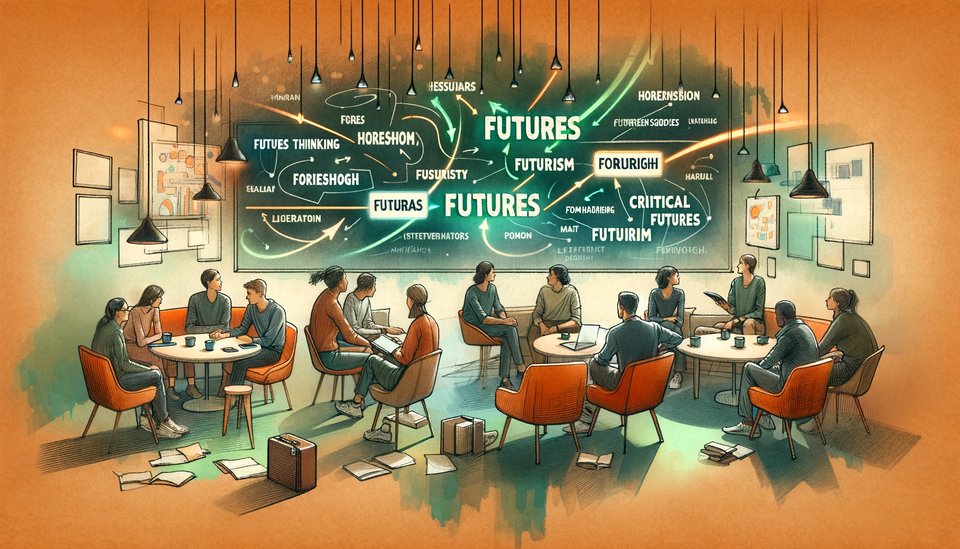Futures Terminology

Welcome back.
In this issue, we delve into futures terminology. Terms like 'foresight,' 'futures studies,' and 'futures thinking' are foundational to our dialogue about tomorrow. They're not just academic labels; they shape our perceptions and influence our strategies for the future. Your interpretations of these terms might vary, and I'm eager to hear them. Please feel free to share your thoughts in the comments. First, let's examine these terms through my lens, establishing a common ground for our upcoming discussions.
Understanding Futures Terms
Working with precise definitions in the context of futures is tricky because there are no generally agreed-upon definitions of futures terminology. Here’s how I understand them:
Futures: This is the umbrella term I use to discuss how humans envision what lies ahead. It underscores the idea that the future isn't a singular, predetermined path but a spectrum of possibilities shaped by our present choices and actions.
Futures Thinking: A general mindset based on the ideas above, rooted in the belief that the future is a canvas of possibilities, is vital for everyone. Recognising that our future is not preordained but moldable can guide us towards more informed and impactful decisions.
Futures Studies: The academic approach to futures thinking, investigating and developing (scientific-ish1) methods to develop multiple futures around a topic, like scenarios, delphies, etc. Sometimes also referred to as futures research.
Foresight: The applied practice of futures thinking, often using methods from futures studies, typically as corporate or strategic foresight in organisations from corporations to politics. When strategy is defining how to get from A to B, foresight can be understood as the precursor helping to determine what B could be.
Futurology: The oldest term, introduced by German futurist Ossip Flechtheim in the middle of the last century. It’s also the broadest one, encompassing the general study of the future, but it’s rarely used today.2
Futurism: After fading into the background, the term 'futurism,' associated initially with an early 20th-century Italian fascist art movement, has re-emerged in contemporary dialogue. It has largely supplanted 'futurology' in public discourse as the go-to term for discussions about the future.3
These relatively short definitions capture my current thinking and are up for debate. I think it’s essential to check in with terms and ideas to update and replace them where necessary and helpful.
Exploring Our Professional Identity
What should we call ourselves as practitioners in this dynamic field? 'Futurologist' sometimes conjures images more akin to mixology or a medical profession, while 'futures researcher' fits if your focus is primarily academic.
Then there's 'futurist.' A term some of us are hesitant to adopt due to its association with tech evangelists who often proclaim inevitable futures. I understand that. You put a lot of rigorous work and thinking into your foresight work and don’t want to be associated with charlatans who put on a show with little substance. So we can surrender the term to them. Or we can use it for the time being as a Trojan horse. Honestly, I find a certain appeal in subverting expectations – being introduced as a 'futurist' and then presenting a nuanced, critical perspective that challenges the audience's preconceptions. So, for now, I’m okay with the label ‘futurist’ when complemented with ‘critical.’ What does ‘critical’ refer to for me? That’s what I will write about next week.
Starting with these foundational definitions is intentional – it's about keeping the dialogue inclusive and accessible. Futures studies and foresight have historically been realms of elite thought, but I believe in democratising these discussions. Remember, these perspectives are mine, and I invite you to share and shape your own. Thanks for coming along.
Quotes of the Week
“Our future will be characterized by a tension between copilot (AI as collaborator) and autopilot (humans as sidekick to AI).”
– Steven Levy in Google’s NotebookLM Aims to Be the Ultimate Writing Assistant
“She'd once heard of something called "the Reverse Anna Karenina Principle": all places that were happy in the climate crisis were happy in their own unique ways, while all unhappy places were the same.”
– Andrew Dana Hudson in Our Shared Storm
Worthy of your Time
The kerfuffle at OpenAI has produced some fascinating long-reads that help to get a better picture of what's going on in the world of Generative AI.
- The New Yorker: The Inside Story of Microsoft’s Partnership with OpenAI
- TIME: CEO of the Year 2023: Sam Altman
Igor has provided an updated definition of his helpful term: Denial of Future Attack.
On the conflict in Israel and Gaza:
Your Empathy is Killing Us by Mushon Zer-Aviv is the best thing I've read about the current situation.
Ezra Klein has some of the most in-depth interviews on his podcast, bringing different voices together and letting them stand beside each other.
Thank you for your attention!
What has sparked your interest? What new question came to mind? What do you want to know more about? Hit reply or use the comment section to let me know.
Have a good one,
Johannes Kleske
I have some pet peeves with this, but I will leave it for another time. ↩
Despite DeepL always translating the German Zukunftsforschung into futurology for me. ↩
I have a Uniqlo shirt with the term on it, but more as an artefact. I'd rather not wear the name of a fascist movement on my body. ↩
Member discussion